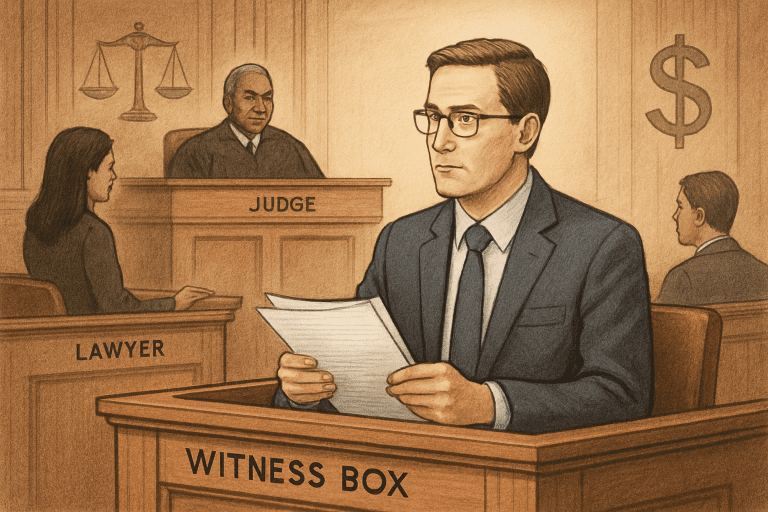Banking Expert Witnesses: Their Role in Financial Litigation

Table of Contents
- Introduction to Banking Expert Witnesses
- Key Responsibilities of Banking Expert Witnesses
- Common Scenarios Requiring Banking Expert Witnesses
- Qualifications of an Effective Banking Expert Witness
- Impact on Court Decisions
- Challenges Faced by Banking Expert Witnesses
- Conclusion
Introduction to Banking Expert Witnesses
Financial disputes are often among the most complex types of litigation, requiring refined expertise to unravel intricate banking systems and regulations. In these cases, bank expert become essential, leveraging deep industry insight to inform courts and clarify matters that might otherwise remain ambiguous. Their role is indispensable in translating technical banking language and regulatory nuances into accessible knowledge for both judges and juries.
The vital contributions of banking expert witnesses have grown as financial markets, products, and regulations become more sophisticated. They are often called neutral figures during litigation, using their objective perspective and specialist credentials to illuminate key facts and practices relevant to a case. Whether navigating issues tied to compliance failures or unpacking fraudulent arrangements, their testimony can shift a court’s understanding and even the case outcome.
Resolving banking disputes without expert testimony is increasingly rare, as courts recognize the value of an independent authority analyzing complex documents, transactions, and institutional behavior. This approach ensures that legal proceedings are well-informed and just, minimizing the risk of verdicts rooted in misunderstanding or incomplete data. The presence of a banking expert witness provides reassurance that both regulatory frameworks and real-world banking operations are fully considered within the litigation process.
As litigation involving financial matters rises, expert witnesses also help courts draw critical distinctions between mere operational errors, intentional misrepresentation, and systemic risks. Effective banking experts must remain rigorous in their review while clearly articulating findings to lay audiences.
Key Responsibilities of Banking Expert Witnesses
- Analyzing Financial Documents: Banking expert witnesses are entrusted with the thorough review of financial records and documentation. This includes identifying subtle discrepancies, patterns of misconduct, or errors that may not be immediately evident to untrained observers. Their attention to detail ensures that all transactions and financial data under review are fully understood and evaluated in context.
- Interpreting Banking Regulations: Each legal matter presents unique questions surrounding bank operations and regulatory standards. These experts are expected to accurately interpret relevant laws and regulations, demonstrating how those rules apply to the particular facts of the case.
- Providing Testimony: One of their primary responsibilities is delivering clear, impartial testimony. This often involves both written reports and oral statements, with the goal of assisting the court in reaching a fair and logical conclusion based on the evidence presented.

Common Scenarios Requiring Banking Expert Witnesses
- Fraud Investigations: In cases of alleged fraud, banks and clients may interpret complex transactions differently. Expert witnesses analyze those transactions to detect signs of fraudulent intent, misappropriation, or concealment, breaking down opaque financial structures into digestible components. According to Thomson Reuters, effective fraud investigations often involve reviewing audit records, electronic logs, emails, and other documentary evidence, as well as examining motive, opportunity, and rationalization to determine who did what, when, and why.
- Securities Litigation: Securities cases typically involve high stakes and intense scrutiny. Banking experts provide critical insights into whether an institution or individual acted within regulatory standards, clarifying issues related to misrepresentation, suitability, and compliance.
- Contractual Disputes: Disputes over contractual terms and banking practices frequently require the input of an expert witness. Their evaluation of banking standards and industry best practices helps determine if contractual obligations were met or breached.
Qualifications of an Effective Banking Expert Witness
- Extensive Industry Experience: Most effective banking expert witnesses have years—if not decades—of direct experience in banking or finance. This real-world background enables them to provide a practical, actionable perspective on complex disputes.
- Regulatory Knowledge: A deep understanding of both state and federal banking regulations is essential. Experts must be able to dissect statutory frameworks and apply them appropriately to the specifics of each case, drawing on an evolving regulatory landscape that demands continual education.
- Analytical Skills: The core function of any banking expert is their ability to analyze, synthesize, and present detailed financial data and findings. Being able to communicate complex concepts succinctly and accurately is fundamental for effective testimony.
Impact on Court Decisions
The role of banking expert witnesses in court cases is highly significant. Their expertise in explaining complex financial strategies, accounting techniques, and banking procedures allows even those without a finance background to understand the details of the case. Fairer outcomes tend to result when decisions are based on factual evidence rather than speculation.
Challenges Faced by Banking Expert Witnesses
- Maintaining Objectivity: One of the most significant hurdles is remaining unbiased, especially in adversarial courtroom environments where pressures from both sides may be intense. A credible expert witness must rely on objective analysis, avoiding personal interests or external pressures that might sway their conclusions.
- Communicating Complex Information: Breaking down highly technical banking data for non-expert audiences is no small feat. Experts must distill complicated findings into clear, straightforward testimony, using accessible language and plain explanations to make their conclusions understandable and useful for the court.
Conclusion
Banking expert witnesses are a cornerstone of financial litigation, making sense of complex banking issues and ensuring legal processes are clear, accurate, and informed by expert perspective. Their role not only informs better judicial outcomes but also supports the integrity of the banking system by holding institutions and individuals accountable to rigorous professional standards.

